WordPress vs. WP Engine Battle Explained
In the world of website hosting and development, few platforms are as essential as WordPress. Powering over 40% of all websites on the internet, WordPress has become synonymous with accessibility, customization, and open-source collaboration. However, recent events have sparked a heated legal battle between WordPress founder Matt Mullenweg and the hosting company WP Engine, leading to concerns over trademarks, governance, and the future of the WordPress ecosystem.
In this blog, we’ll explore the WordPress vs. WP Engine battle, the root causes of the conflict, its impact on the community, and what it means for website owners and developers alike. At Creative Nose Digital, we specialize in navigating complex digital landscapes like this, offering our clients clarity and guidance. Let’s see the controversy that’s dividing the WordPress community.
What are WordPress and WP Engine?
WordPress is an open-source content management system (CMS) that allows users to create, manage, and host websites. It’s free, highly customizable, and supports an array of themes and plugins. While anyone can self-host their WordPress site, many users prefer managed hosting services that provide seamless installation and updates, like those offered by Automattic (Mullenweg’s company) and WP Engine.
WP Engine is a hosting company that provides premium, managed hosting services for WordPress websites. They offer a more hands-off experience by handling WordPress updates, performance enhancements, and security features, making it an attractive solution for businesses and agencies.
However, the relationship between Automattic (WordPress) and WP Engine soured when WP Engine’s use of the “WP” brand name and their business practices came into question.
The Origins of the WordPress vs. WP Engine Conflict
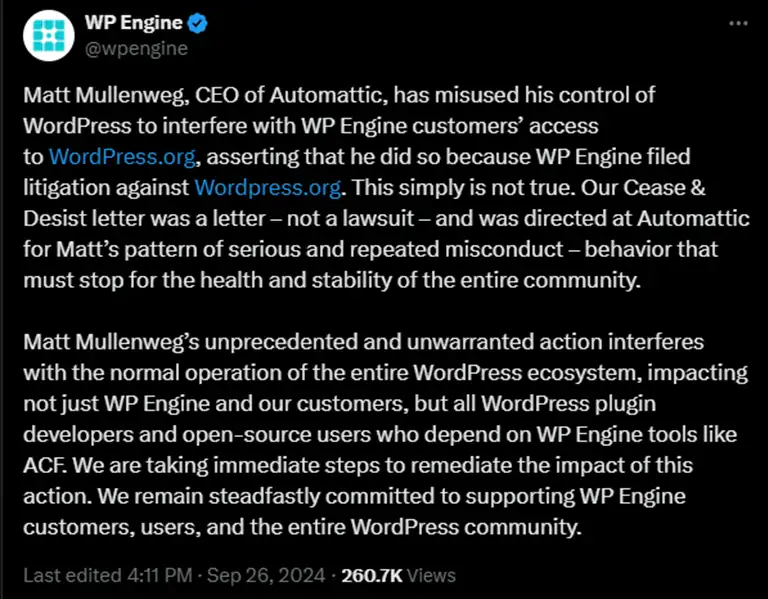
The controversy began when Matt Mullenweg, the co-founder of WordPress and CEO of Automattic, publicly criticized WP Engine, calling them a “cancer to WordPress.” Mullenweg accused WP Engine of disabling the feature that allows users to view and track post revisions, a key aspect of the platform that he believed was essential for protecting user data.
He also took issue with WP Engine’s use of the “WP” brand, stating that it confused users into thinking WP Engine was part of the official WordPress project. Mullenweg argued that WP Engine profited massively from the WordPress ecosystem without giving back in terms of contributions to the open-source project.
Legal Battle: Trademarks and Cease-and-Desist Letters
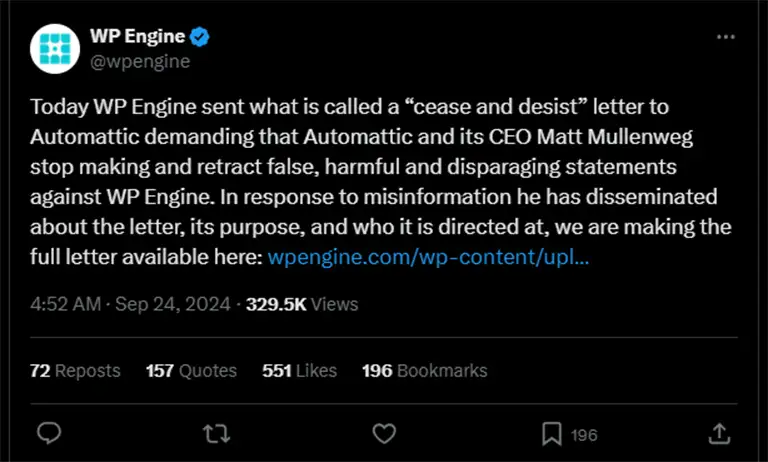
The disagreement escalated into a legal dispute when WP Engine issued a cease-and-desist letter to Mullenweg and Automattic, demanding the withdrawal of public comments that criticized the company. WP Engine claimed that Mullenweg threatened to take a “scorched earth” approach if WP Engine didn’t comply with demands to pay a portion of their revenue for the use of the WordPress trademark.
In response, Automattic fired back with its own cease-and-desist letter, citing trademark infringement by WP Engine. Automattic also updated the WordPress Foundation’s Trademark Policy, explicitly stating that companies, including WP Engine, should not use the “WP” abbreviation in ways that confuse users into believing they are associated with WordPress.
WP Engine, in turn, altered their branding and descriptions on their website to clarify that they are not directly affiliated with WordPress or Automattic. This includes changing plan names from “Essential WordPress” to simply “Essential,” to avoid any potential legal entanglement over the use of WordPress-related terms.
Impact on the WordPress Community
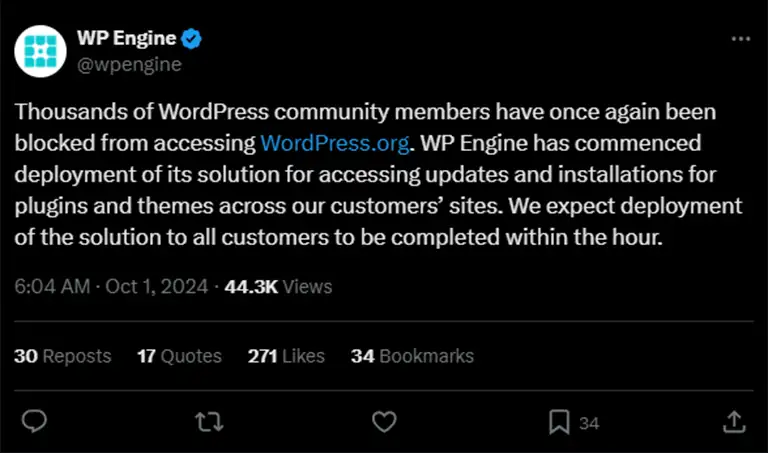
Perhaps the most significant impact of this battle is the ban WP Engine faced from accessing resources on WordPress.org, including plugins and themes. While WordPress is open source, hosting companies like WP Engine need to run specific services to access WordPress.org resources, which Mullenweg cut off. This ban initially left many WP Engine-hosted websites vulnerable, unable to update crucial security patches or install new plugins.
This sparked outrage in the WordPress developer community, as many feared this dispute might be a precursor to stricter control over how WordPress’s open-source projects are governed and accessed. Developers and hosting companies alike are worried about future restrictions, especially if Mullenweg and Automattic exert further influence over the WordPress ecosystem.
Trademarks and Open Source: The Core Issue
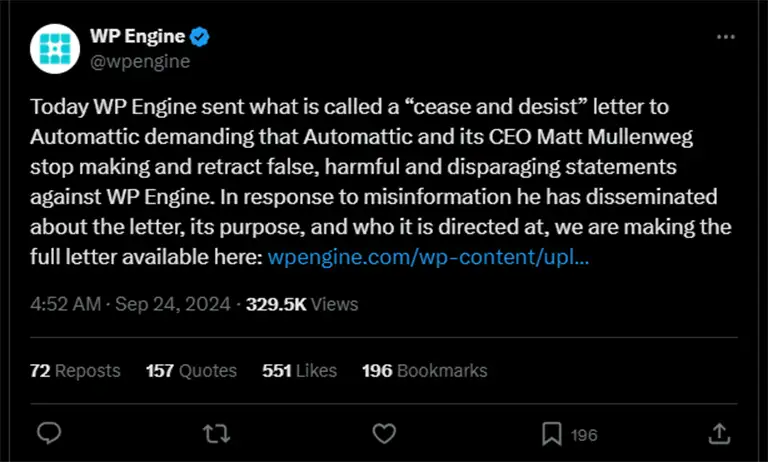
At the heart of the WordPress vs. WP Engine conflict is the delicate balance between maintaining open-source integrity and enforcing trademark protections. WordPress is an open-source project, which means it is built on community contributions and remains free for anyone to use. However, the WordPress Foundation owns the trademark to the name “WordPress,” and companies are restricted in how they use it for commercial purposes.
This legal battle revolves around whether WP Engine’s use of the “WP” abbreviation violates the spirit of open-source and trademark law. Mullenweg believes that WP Engine should contribute more to the open-source project, given how much they profit from hosting WordPress sites, while WP Engine maintains that they are operating within their legal rights under fair use.
What This Means for Website Owners and Developers
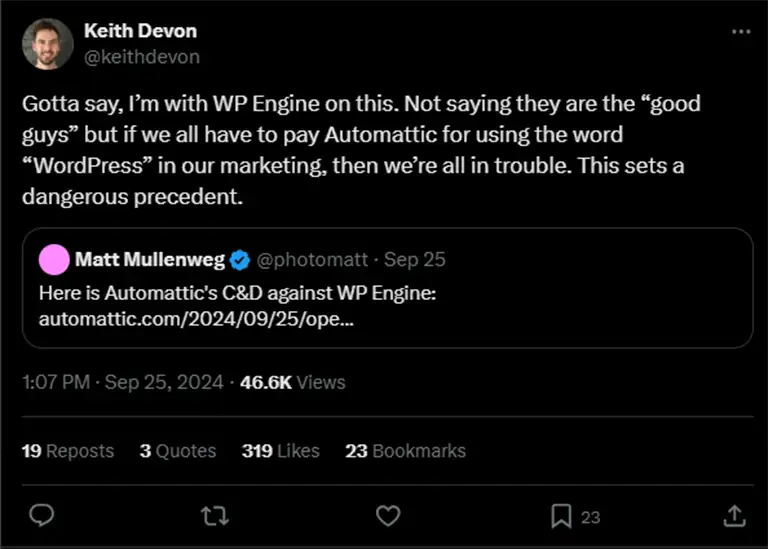
For WordPress users and developers, this legal battle raises several concerns about the future of the platform and the ecosystem surrounding it. With 40% of the internet powered by WordPress, many developers rely on its resources for their livelihood. Hosting companies like WP Engine offer a more accessible way to manage WordPress websites, but the restrictions placed on their access to WordPress.org could set a precedent for future conflicts between open-source ideals and commercial interests.
As of now, WP Engine has temporarily regained access to WordPress.org resources, but the battle is far from over. The lawsuit filed by WP Engine against Automattic and Mullenweg claims abuse of power and governance conflicts, further complicating the matter. Additionally, concerns are mounting that Automattic’s control over WordPress’s open-source projects could limit developers’ ability to freely use and distribute the software.
Looking Ahead: What’s Next in the WP Engine vs. WordPress Battle?
The legal battle between WP Engine and WordPress is ongoing, with WP Engine recently updating its site’s branding to avoid further trademark issues. However, the larger question remains: what will the future of WordPress look like if commercial interests and open-source governance continue to clash?
At Creative Nose Digital, we stay ahead of trends and issues in the digital landscape, helping businesses make informed decisions. As this situation develops, we recommend keeping an eye on how WordPress evolves, especially for businesses that rely heavily on WordPress-managed hosting.
If you’re concerned about how this legal battle might impact your business’s website, contact Creative Nose Digital for personalized advice and solutions. We specialize in creating and managing websites that reflect your brand’s identity, regardless of the platform changes happening behind the scenes.
Conclusion
The WordPress vs. WP Engine legal battle highlights an ongoing struggle between open-source ideals and commercial profitability. As WordPress continues to grow and power much of the web, tensions over trademarks, governance, and the future of the ecosystem are likely to persist.
Businesses that rely on WordPress should remain informed about these developments and ensure their hosting and website management choices are aligned with their long-term digital strategies. At Creative Nose Digital, we’re here to guide you through the complexities of website management and digital marketing.
Stay ahead of the curve and future-proof your website with our expert team. Reach out today to learn more about how we can help you thrive in a rapidly changing digital world.